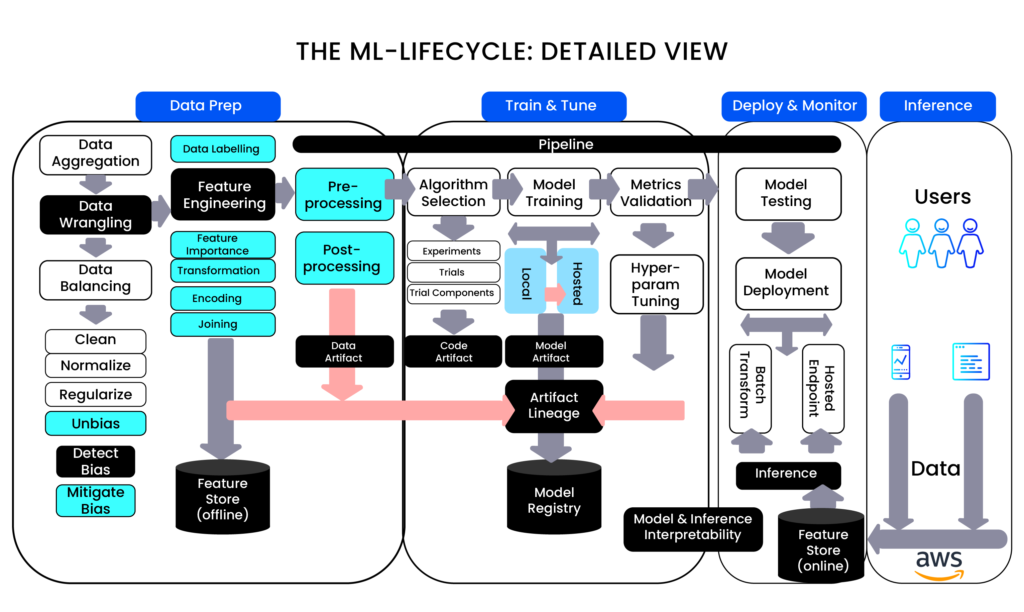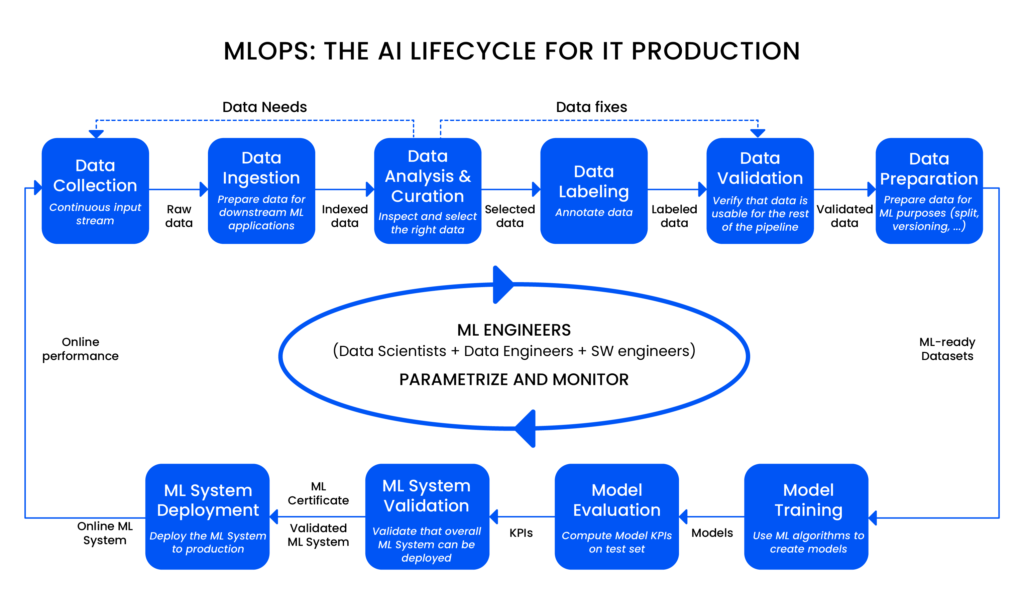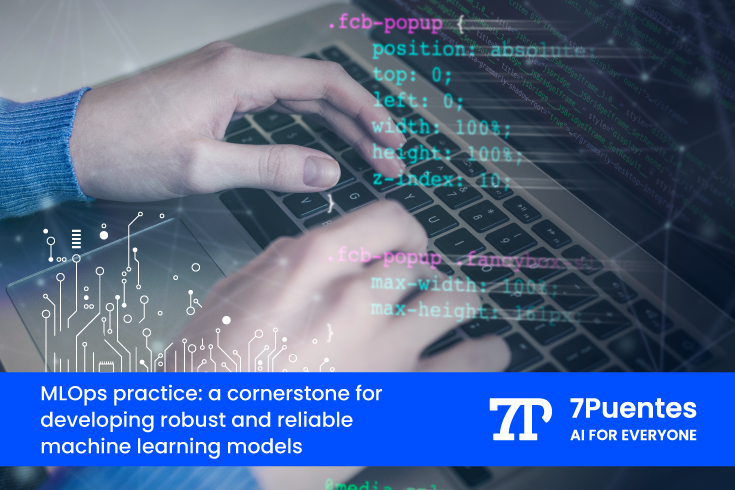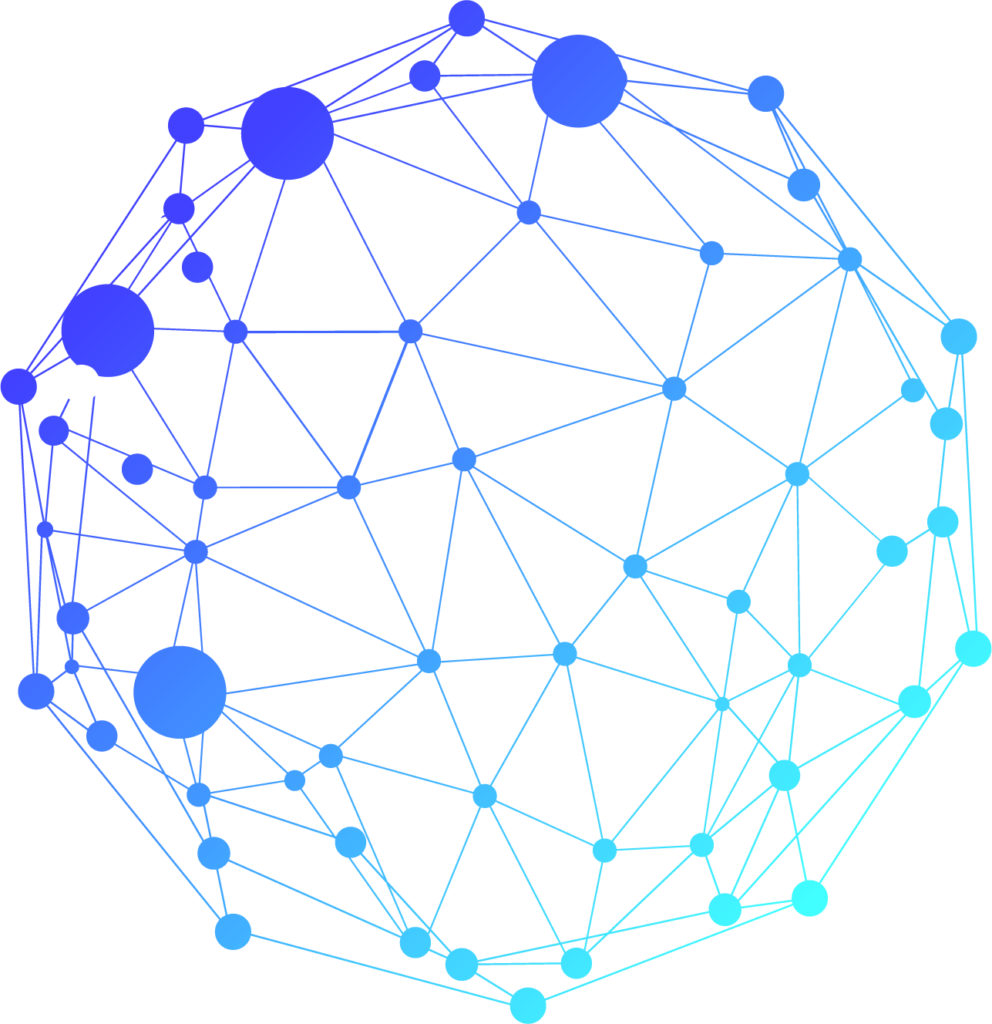In this article, we’ll tell you how to efficiently incorporate MLOps practice into your organization as part of the AI lifecycle, and why this practice is important – especially in the oil and gas sector – as it significantly improves the reliability of machine learning models. Join us on this tour of strategic AI learning!
Currently, machine learning operations are being combined into a valuable practice called MLOps, which automates and simplifies machine learning (ML) workflows and implementations. Any organization or business can use MLOps to automate and standardize processes throughout the ML lifecycle. These processes include model development, testing, integration, deployment and infrastructure management. However, the entire implementation is not without its challenges and requires a certain level of organizational maturity, as it is not simply about integrating a tool or application package.
While MLOps is based on the existing discipline of DevOps (the modern practice of efficiently writing, deploying and running enterprise applications) and is a subset of DevOps, AI-based models require careful monitoring through cycles of experimentation, tuning and retraining to maintain very high accuracy and efficiency.
Current problems in ML that require a specific solution
It is clear that an increasing number of companies have multiple software-based projects and initiatives that require a comprehensive view of the software components, across all ML models. A phenomenon related to this vision is that the supplier market itself has started to sell us applications and cloud products (especially due to the current battle between Amazon, Google and Microsoft). However, this only solves the storage and infrastructure part of the models, not the whole lifecycle, which requires much more sophisticated tasks.
When we talk about MLOps, it is not just about managing the code, the deployments and the infrastructure of the models, but it is about standardizing the way of working and managing these models. For this reason, it is not just about tools, but also about very clear working policies.
Let’s take a look at the main difficulties that arise when working with AI models and how MLops can provide concrete solutions:
- Training the models: More and more models are «coming out of the sandbox» and going into production. However, when data scientists train these models, they need to run several experiments, search for hyperparameters, see the training and learning curves, and be able to document the process. At the same time, the data scientist or ML engineer needs to present the results of training the model to their customer so that they can see that it really works well, that it is robust, and that the tests were varied and error-free enough to go into production. Without MLOps, all of this is virtually impossible, and the risk is to believe that a few executions of the model that worked well are enough to put it into production.
- Labelled data sets: Another key issue is tagging data sets, as the criteria for tagging data can have security, data sensitivity, privacy, compliance, etc. aspects. It is not just a question of testing and developing a model, but of doing so with ethical and operational principles that guarantee reliability for the company.
- Access to data sources and access control: Consistent access to datasets is essential for responsible working. If there is a data lake for the model, then the data scientists who really need to access it can be controlled and it must be determined how they access it, what permissions they have, who they are, what information they can see and what resources they can consume. Clearly, this is an infrastructure need that needs to be addressed in practice. The same goes for security: who can ultimately consume this model and how it converges with the rest of the IT security policy. Because in many cases it improves delivery, and even for confidentiality reasons, it means that some of the data scientists will not be exposed to sensitive company data.

Key principles of MLOps
Among the key principles and benefits of implementing the MLops practice in your organization, we can highlight the following
- Version Control: When we work with a fintech, mass consumption or oil model, the data is dynamic and changes from month to month. Therefore, we need to update these models with new data, so every quarter or semester we launch a new version of the model. This is where MLops helps us to automatically control the version management and update the training and testing of the models with this new data.
- Security: As we mentioned before, it helps us to manage access control, data protection and monitoring of our company, so that our AI project is aligned with the set of infrastructure and cybersecurity policies of the organization.
- Automation: MLOps helps us automate the various stages of the machine learning pipeline to ensure repeatability, consistency and scalability. This includes stages such as data ingestion, preprocessing, model training and validation, and deployment.
- Traceability and continuous monitoring: In MLOps, we can continuously monitor the code and data because we keep the «logs» of the tests and experiments performed. Since these models are dynamic and learn from new data, it is important to keep the logs of both the experiments and the applications (APIs) as they are deployed.
- Scalability: When we have multiple software and AI projects running in parallel, this practice helps us scale not only the volume of data in the projects, but also the accuracy and robustness of the results. Let’s think about organizations that have millions of users or customers and need to constantly fine-tune these models.
- Better model governance: MLOps helps improve team collaboration, promotes effective communication throughout the AI and ML project lifecycle, documents the entire process, including collecting feedback on model predictions to train them further, and, as mentioned above, ensures that confidential company data is protected.

What are the risks of misuse?
MLOps can be a productivity «bottleneck», especially if the organization imposes too many restrictions or bureaucratic obstacles. If the organization does not manage data management in an agile way, the model may fail. Being an organization with stable and robust models does not mean resisting change or data dynamics, so there is a constant tension.
Or models may be created that are impossible to maintain over time, especially if the organization is not sufficiently mature or prepared to implement MLOps, or if it is simply implemented without prior experience.
Benefits for the Oil & Gas Industry
There is no doubt that the implementation of MLOps practice for the Oil & Gas industry offers multiple benefits. From the point of view of the characteristics of the sector, its formality and the need for robustness, reliability and sensitivity of data, this type of practice is essential and therefore needs to be strategically evaluated as an executive in the sector.
It is clearly a major challenge for a company that has never built AI models to have the necessary maturity to incorporate a practice that is acquired precisely with this maturity. But it is not impossible or unfeasible, on the contrary: you can find a strategic one in our services.
7Puentes: an expert in this ML practice
To use a metaphor from a completely different field, adopting an MLOps practice is like adopting a health and safety practice in the company: it is not achieved overnight and it is difficult to adopt if the company does not have a qualified specialist who really knows the basics and the needs of this practice for the company.
At 7Puentes we have more than 15 years of experience and more than 100 ML projects carried out all over the world. We have a deep knowledge of technology and software implementation in different industries, and we understand the needs and possibilities of the organizations we consult.
Are you ready to explore the possibilities of MLOps for your ML model? We invite you to experience our way of working, our team, our agile methodologies and implement the data-driven change you need in your organization to make your AI efficient and robust.
It is a cultural and strategic change where 7Puentes will help you integrate this practice in your organization by understanding the core of the business. Contact us!


